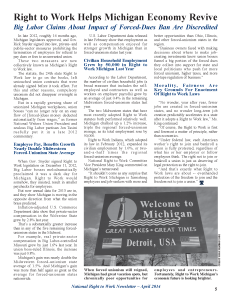Will Team Biden Weaponize Workers’ Pensions?
Big Labor abuse of worker pension and benefit funds as a means of advancing union bosses’ self-aggrandizing policy objectives is a familiar phenomenon.
(Click here to download the April 2014 National Right to Work Committee Newsletter)
Big Labor Claims About Impact of Forced-Dues Ban Are Discredited
 In late 2012, roughly 16 months ago, Michigan legislators approved, and Gov. Rick Snyder signed into law, private- and public-sector measures prohibiting the termination of employees for refusal to pay dues or fees to an unwanted union.
In late 2012, roughly 16 months ago, Michigan legislators approved, and Gov. Rick Snyder signed into law, private- and public-sector measures prohibiting the termination of employees for refusal to pay dues or fees to an unwanted union.
These two measures are now collectively known as Michigan’s Right to Work law.
The statute, the 24th state Right to Work law to go on the books, left untouched union contracts that were already signed before it took effect. For this and other reasons, compulsory unionism did not disappear overnight in Michigan.
But in a rapidly growing share of unionized Michigan workplaces, union bosses “can no longer rely on an easy flow of [forced-]dues money deducted automatically from wages,” as former National Writers Union President and zealous Big Labor partisan Jon Tasini ruefully put it in a late 2012 commentary.
Employee Pay, Benefits Growth Nearly Double Midwestern Forced-Unionism State Average
When Gov. Snyder signed Right to Work legislation on December 11, 2012, Big Labor bosses melodramatically proclaimed it was a dark day for Michigan. Right to Work would somehow, they insisted, result in smaller paychecks for employees.
But now annual data for 2013 are in, and they show Michigan is moving in the opposite direction from what the union brass predicted.
Inflation-adjusted U.S. Commerce Department data show that private-sector compensation in the Wolverine State grew by 2.8% last year.
That’s a substantially greater increase than in any of the five remaining forced-unionism states in the Midwest.
For example, real private-sector compensation in Big Labor-controlled Missouri grew by just 1.6% last year. In union boss-ruled Illinois, the increase was just 0.8%.
Michigan’s gain was nearly double the Midwestern forced-unionism state average of 1.5%. And Michigan’s gain was more than half again as great as the average for forced-unionism states nationwide.
U.S. Labor Department data released in late February show that employment as well as compensation enjoyed far stronger growth in Michigan than in forced-unionism states last year.
Civilian Household Employment Grew by 50,000 in Right to Work Michigan Last Year
According to the Labor Department, the number of civilian household jobs (a broad measure that includes the self-employed and contractors as well as workers on employer payrolls) grew by an average of just 0.4% in the remaining Midwestern forced-unionism states last year.
The two Midwestern states that have most recently adopted Right to Work statutes both performed relatively well. Michigan chalked up a 1.2% increase, triple the regional forced-unionism average, as its total employment rose by 50,000.
Right to Work Indiana, which adopted its law in February 2012, expanded its civilian employment by 1.0%, or two-and-a-half times the regional forced-unionism average.
National Right to Work Committee Vice President Mary King commented on Michigan’s turnaround:
“It shouldn’t come as any surprise that Right to Work Michigan is furnishing employees and job-seekers with more and better opportunities than Ohio, Illinois, and other forced-unionism states in the region.
“Business owners faced with making decisions about where to make job-creating investments know union bosses funnel a big portion of the forced dues they collect into support for state and local politicians who push for more forced unionism, higher taxes, and more red-tape regulation of business.”
Morality, Fairness Are Key Grounds For Enactment Of Right to Work Laws
“No wonder, year after year, fewer jobs are created in forced-unionism states, and no wonder long-term job creation predictably accelerates in a state after it adopts a Right to Work law,” Ms. King continued.
“Of course, the Right to Work is first and foremost a matter of principle, rather than economics.
“Under federal law, each American worker’s right to join and bankroll a union is fully protected, regardless of what his or her employer or fellow employees think. The right not to join or bankroll a union is just as deserving of legal protection as the right to join.
“And that’s exactly what Right to Work laws are about — evenhanded protection of the freedom to join and the freedom not to join a union.”

Big Labor abuse of worker pension and benefit funds as a means of advancing union bosses’ self-aggrandizing policy objectives is a familiar phenomenon.

Leaked CTU Proposals Won’t Do Anything to Improve Schools’ Poor Performance

What impact does handing a union monopoly power to deal with your employer on matters concerning your pay, benefits, and work rules have on your pay?